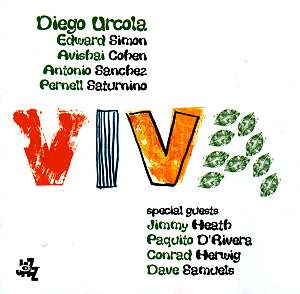1. Tango Azul
2. Viva
3. Afroraffo
4. El Camino
5. Blues for Jimmy
6. 40/40
7. Sound for Sore Ears
8. Adios Nonino
9. Gringo Dance
10. Emilia
Diego Urcola – Trumpet, flugelhorn
Edward Simon – Piano
Avishai Cohen – Bass
Antonio Sanchez - Drums
Pernell Saturnino – Percussion (tracks 2-4,
6, 7, 9, 10)
Jimmy Heath – Tenor sax (tracks 5, 7)
Paquito D’Rivera – Alto sax, clarinet (tracks
3, 6, 10)
Conrad Herwig – Trombone (tracks 1, 4, 5, 9)
Dave Samuels – Marimba, vibes (tracks 3, 8)
Emilia Urcola – Voice (track 10)
Argentinian
trumpeter Diego Urcola, now resident in New
York, is not well-known in Britain but he
plays in groups led by Paquito D’Rivera and
Dave Samuels and this album (his third CD)
has an all-star cast. You might expect a set
of Latin jazz from an Argentinian musician
but there is a surprisingly wide range of
styles on this album.
The
first two tracks are rather mournful, with
Diego’s trumpet leading you to realise why
he has been compared to Miles Davis, since
he often has a similar "little boy lost"
sound. But Afroraffo perks things up,
with Paquito D’Rivera’s bright alto sax and
Dave Samuels guesting on marimba. We return
to mournfulness with El Camino, as
Conrad Herwig’s trombone states a sad
theme.
Blues
for Jimmy brings another contrast – a
beboppish blues featuring Jimmy Heath blending
jauntily with Diego. Conrad Herwig contributes
a muscular solo and then joins with Jimmy
and Diego in swapping fluent fours with drummer
Antonio Sanchez.
We
are back in Miles Davis territory again with
40/40 in a gentle tango rhythm, introduced
delicately by Diego and decorated by Paquito’s
clear-toned clarinet. It unexpectedly segues
into a bustling samba, with Diego soloing
on flugel and then the clarinet riding uninhibitedly
over the band. Jimmy Heath’s composition Sound
for Sore Ears has a Latin feel but occasionally
slips into four-four, with Diego’s masterly
trumpet sounding very Cuban and pianist Edward
Simon soloing lucidly in Latin-American style.
Dave
Samuels returns on vibes for Astor Piazzolla’s
Adios Nonino, with both Urcola and
Samuels bringing out the poignancy of the
piece. Gringo Dance has an intriguing
rhythm which seems to shift from one beat
to another. The final track is Emilia,
with its dedicatee - Urcola’s young daughter
Emilia - gurgling in the background (shades
of Stevie Wonder’s Isn’t She Lovely?).
Diego’s flugelhorn blends seamlessly with
Paquito’s clarinet – but then they have played
together for many years.
Viva
is a vivacious and varied album. I don’t recall
noticing Diego Urcola particularly before
but I’ll listen out for him from now on.
Tony Augarde
